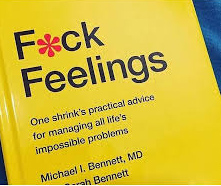IX.30.20 - Own Your Feelings
These are unusual times by any measure. A pandemic has killed over one million people worldwide, and 20% of the deaths have occurred in the United States. The pandemic has crippled the global economy and forced us to withdraw from the comfort of social gatherings, workplaces, schools and routines. Our children are asking questions that we can’t answer because the “novel” coronavirus has not revealed all of its destructive capabilities. An effective response to Covid-19 that will ensure our safety is still many months (if not years) away.
My partner asked her 90-year-old mother — who lived through the Great Depression and World War II — if she could recall a time as tense, dangerous and disconcerting as what we are currently experiencing. Her mother could not. These are unusual times, but let’s not become prisoners of our feelings, especially as we seek solace online.
It is impossible not to feel something, and that’s a good thing. In ordinary, pre-pandemic times, the smallest disturbance could trigger an emotional reaction without warning if you were not prepared to balance your reaction with mindfulness and context. As the comedian Mel Brooks said, “Tragedy is when I cut my finger. Comedy is when you fall into an open sewer and die.” Without mindfulness (and even laughter), our feelings coil tighter. When you blame circumstances for how you feel, you absolve yourself from something that you are ultimately responsible for. The emotional noose tightens, and your ability to think dissolves.
Instead, feel without guilt or shame. Embrace your feelings because it's important to feel — it’s what makes us human. Let the ancient, hard-wired authenticity of your feelings inform you…not overwhelm you. But, sometimes, our perceptions that trigger intense feelings may not be a scaled reaction to what is happening. As Bill Murray said in the movie, Meatballs, “…it just doesn’t matter.”
When you feel triggered to emote in a counter-productive way, this is a framework that may help align your feelings with reality.
· Recognize how you're feeling.
· Acknowledge that you are responsible for how you feel.
· Allow yourself to feel without blame or shame. Think about how you are feeling.
· Don't feel guilty or immobilized by the intensity of your feelings.
· Take yourself out of your mind and into your body. Ask yourself where you're feeling and start letting your feelings go from the different parts of your body (yoga wisdom).
· Breathe. Inhale deeply…hold 10 seconds…exhale slowly. Repeat three times.

Here is a book that can help you navigate and take control of your emotional state. Dr. Michael & Sarah Bennett’s book,  F*ck Feelings, combines comedy and psychiatric counselling to provide ‘self-help’ to people who feel like their feelings are overwhelming their ability to function “normally” and effectively.
F*ck Feelings, combines comedy and psychiatric counselling to provide ‘self-help’ to people who feel like their feelings are overwhelming their ability to function “normally” and effectively.
Johann Hari takes a radical (yet practical) approach to replace psycho-pharmaceuticals as the solution to depression and anxiety. In his book,  Lost Connections, Hari asks an important question, “What if depression is, in fact, a form of grief — for our lives not being as they should? What if it is a form of grief for the connections we have lost, yet still need.” Social isolation is our current reality, but depression and anxiety do not need to be the outcomes.
Lost Connections, Hari asks an important question, “What if depression is, in fact, a form of grief — for our lives not being as they should? What if it is a form of grief for the connections we have lost, yet still need.” Social isolation is our current reality, but depression and anxiety do not need to be the outcomes.
Finally, your reaction to these unusual times will impact — positively, negatively or neutrally — how your family and friends perceive what is happening. It’s a wonderful feature of evolution that we can feel and describe how we feel. Allow your feelings to inform your thinking, but don’t let your feelings rule, and overwhelm your rational approach to this challenge. As the great philosopher, Jerry Garcia, said: “ I Will Get By.”
I Will Get By.”
